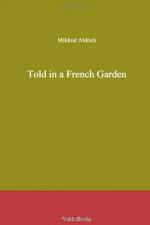Often, when the charm of her spirit was on me, I would pretend to weave a spell about her, and conjure the spirit that was imprisoned in the heart that was mine, to come forth from the shrine he was so impudently usurping.
Ah, those were the days of my youth!
We had been betrothed but a brief time when Rodriguez, for some seasons a European celebrity, made his first appearance in our city.
I had heard most of the great violinists of that time, had known some of them well, had played with many of them, as I did later with Rodriguez, but I had never chanced to see or hear him.
His fame had, however, preceded him. The newspapers were full of him. Faster even than the tales of his genius had travelled the tales of his follies—tales that out-Don-Juaned the famous rake of tradition.
However little credence one gives to such reports—mad stories of a scandalous nature—these repeated episodes of excesses, only tolerated in the conspicuous, do color one’s expectations. I suppose that, being young, I expected to see a man whose face would bear the brand of his errors as well as the stamp of his genius.
That was not Rodriguez’s fate. Whatever the temperamental struggle had been, he was “take him for all in all,” the least disappointing famous man that my experience had ever shown me. He was more virile than handsome, and no more aesthetic to look at than he was ascetic. At that time he was on the sunny side of forty, and not yet at the zenith of his great career. His face was fine, manly, and sympathetic. His brow was broad, his eyes deep-set and widely spaced, but very heavy lidded. The mouth and chin were, I must own, too delicate and sensitive for the rest of the face. His dark hair, young as he was, had streaks of grey. In bearing he was so erect, so sufficient, that he seemed taller than he was. If he had the vanity which so often goes with his kind of temperament, it was most cleverly concealed. Safe in the dignified consciousness of his unquestioned gifts, secure in his achievements, he had a winning gentleness, and an engaging manner difficult to resist.
But for a singular magnetic light in his eyes, which belied the calm of his bearing, when he chanced to raise the heavy lids full on one—they usually drooped a little—but for a sensitive quiver along the too full lips, as if they still trembled from the caress of genius—the royal accolade of greatness—he might have looked to me, as he did to many, more the diplomat than the artist.
It would be useless for me to analyse his command of his instrument. I could not. It would be superfluous for me to recount his triumphs. They are too recent to have been forgotten. Both tasks have, moreover, been done better than I could do either.
This I can do, however, bear witness to the glowing wings of hope, of longing, of aspiration which his singing violin lent to hearts oppressed by commonplace every-day cares, to the moments of courage, of re-awakened endeavor which he inspired in his fellowmen, to the marvellous magnetism of his playing which seemed for the moment to restore to a soul-weary world its illusions, and to strike off the fetters of despondency which bind mortality to earth.




